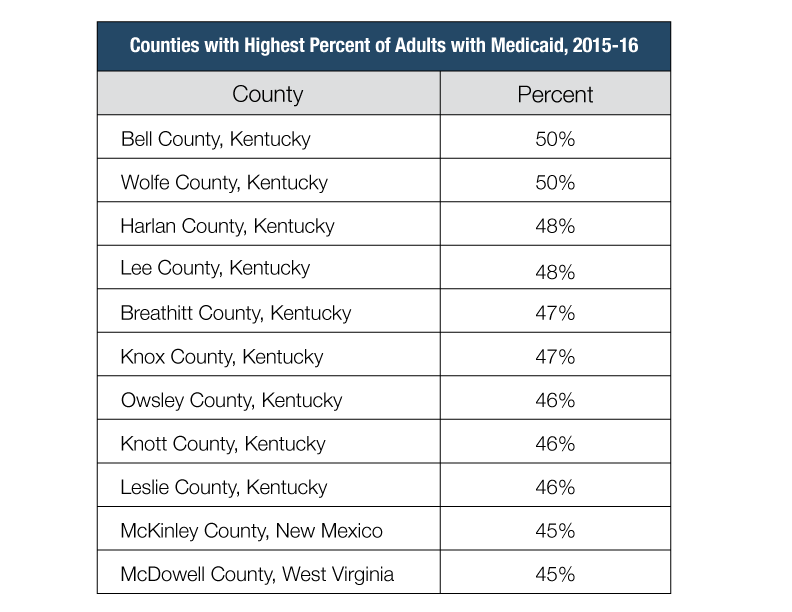In 2017, we embarked on a new project with the Rural Health Research Program at the University of North Carolina Sheps Center for Health Services Research to examine the role of Medicaid in rural areas and small towns. In our first report, Medicaid is a Lifeline for Small Towns and Rural Communities, we highlighted the important role Medicaid plays in these areas. Working with our partners at UNC we have updated this data set by county – you can click here to see the percent of kids enrolled in Medicaid in rural areas for your state, or here for adults. The data is from 2015/16 – our previous data was from 2014/15 – so it includes a deeper dive on the impact of Medicaid expansion for those states that expanded in 2014 and 2015.
We will be doing more work with this data in the near future, but the first thing I took a look at was which rural counties nationwide have the highest percentage of adults on Medicaid. I wrote a blog about this last year and at that time, 6 of of the top 10 rural counties nationwide for percent of adults covered were in Kentucky, underscoring the importance of Medicaid to rural parts of the state.
As Medicaid expansion has been implemented, its importance to rural Kentucky has grown and is really quite staggering. This round of data finds that 9 out of the top 10 rural counties nationwide with percent of adults on Medicaid are in Kentucky and enrollment of adults in these counties ranges from 45 to 50 percent!
As regular readers of SayAhh! know, the state of Kentucky has been prevented from implementing its pending Section 1115 waiver, which will result in considerable coverage losses (estimated by the state to be approximately 100,000). What these data make even more clear is that rural counties have an enormous amount at stake with respect to future court action on this case.
The Kentucky waiver proposal includes numerous harmful features. While “community engagement” requirements have gotten the most attention, there are many other barriers to coverage including multiple “lockouts” for paperwork and other errors, the elimination of retroactive eligibility, and higher premiums which will cause folks to lose coverage. Some of these rural counties (Bell, Harlan, Letcher, Leslie, and Knox) are exempt from community engagement requirements, but not the other punitive aspects of the waiver. If this proposal goes forward, these struggling rural communities will be pushed further down the economic ladder.



